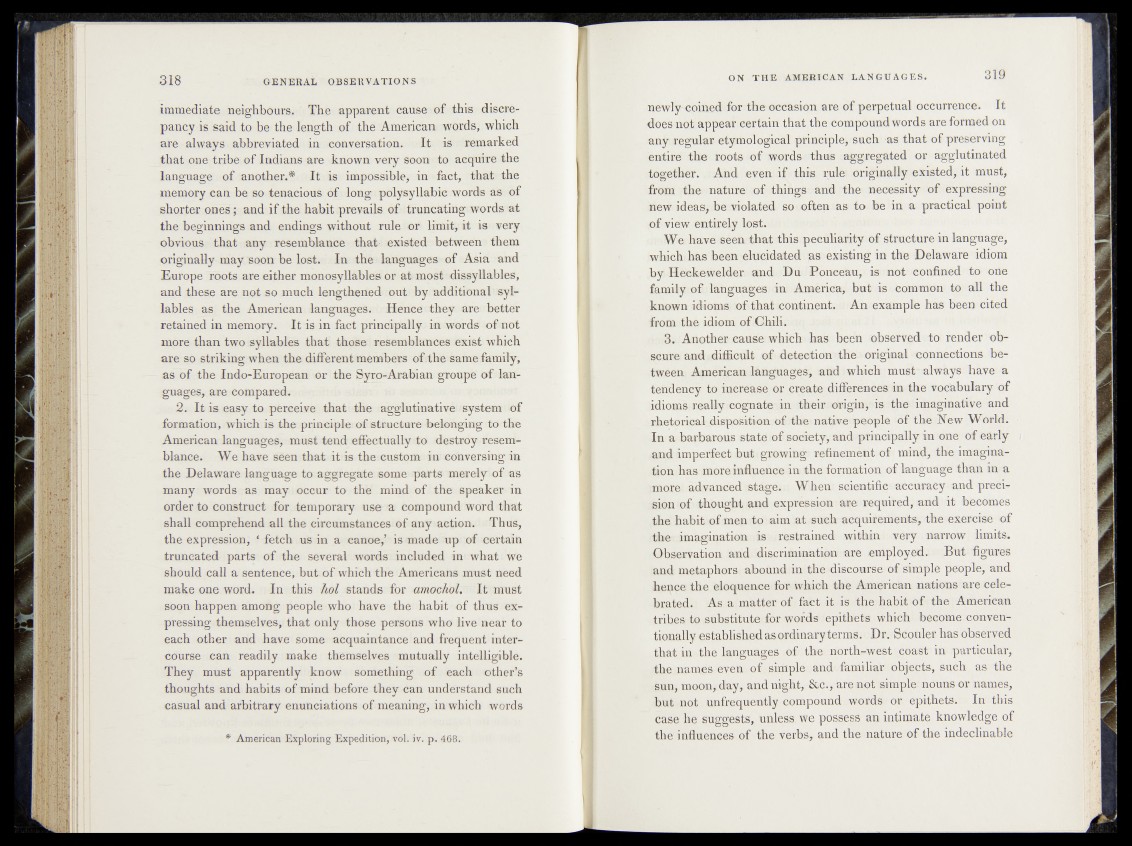
immediate neighbours. ' The apparent cause mf this discrepancy
is said to be the length of the American words, which
are always abbreviated in conversation. It is remarked
that one tribe.©f Indians are known very score to acquire the
language of another.* It is impossible, in fact, that the
memory can be so tenacious of long polysyllabic words as of
shorter ones j and if the habit prevails of truncating, words at
the beginnings and endings without rule or limit, it is very
obvious that any resemblance that existed between them
originally may soon be lost. In the languages of Asia and
Europe roots are either monosyllables or at most dissyllables,
and these are not so much lengthened out by additional' syllables
as the American languages. Hence they are better
retained in memory. It is in fact principally in words ofnof
more than two syllables that those resemblances exist which
are so striking when the different members of A e same family,
as of the Indo-European or the Syro-Arabian groupe of languages,
are compared.
It is easy to perceive that the agglutinative > system of
formation, which is the principle of structure belonging to the
American languages, must tend effectually to rlestroy resemblance.
We have seen that it is the custom in conversing in
the Delaware language to aggregate some parts merelyiof as
many words as may occur to the mind of the speaker in
order to construct for temporary use a compound word that
shall comprehend all the circumstances of any aetionu Thus,
the expression, ‘ fetch us in a canoe,’ is made up of certain
truncated parts of the several words included in what -we
should call a sentence, but of which the Americans must need
make one word. In this hoi stands for amochol. It must
soon happen among people who have the habit of thus expressing
themselves, that only those persons who live near to
each other and have some acquaintance and frequent intercourse
can readily make themselves mutually intelligible.
They must apparently know something of eaeh other’s
thoughts and habits of mind before they can understand such
casual and arbitrary enunciations of meaning, in which words
* American Exploring Expedition, vol. iv. p. 468.
newly-coined for thcoccasion are öf perpetual occurrence. It
doesmojAppeaf certain that A e compound words are formed on
any regular etymological prinrapleffsuöh as that of preserving
entire the roots of words thus „aggregated or-agglutinated
together. And even* if this rule: originally existed^itmugt,
from the nature of things and the necessity of expressing
new ideag^ibe-violatedi so -.often1 as to. be ‘ in a practical point
of view entirely lost.
i We have seenAattbis peculiarity: of structure in language,
which j has been elucidated - ;as i existing in the Delaware idiom
by Heokewelder, and Du Ponceau, is not c©afioediO! ofle
femdysof languages in America, but is common to all the
known idioms- of that continent.? •i An example has been cited
from)thfe id*®® ofiChili.
Atiother eaUiterwhieAbas been observed to* fender obscure,
andAfflcult ofdeteetion the:^ origmal coiiiicCtions between^
American languages-, and which must- aIwaysA®-ve a
tendency to increase or create differences in the vocabulary of
idioms ready? cognate - in Aeir rorighayds the imaginative and
rhetorical disposition of the native*people of the Ifew World.
In a barbarous state of sodtety, and principally in one of early
and imperfect but growing refinement ©fe mind, theimagma-
tion has more influence in the formation of language than in a
rmore advanced : stagesi: When'; scientifireaccuracy and preci-r
gforeof Aought and expression aaj© requited, and it becomes
the habit of men to aim at such a^ukem&nfc, the exercise of
Ae imagination is restrained wittón very-marrow limits.
:Obaervation and discriminaticm*«re employed;©-: But figures
and metaphofSrahaendiin Aevdiscowsg*©f simple pööjM^ and
hence the eloquence for which the American nations are celebrated*:
As a matter of fact it i&ilthe -habit of the American
tribes to substitute: for words ^epithets which: become conventionally
established as ordinary terms.. ‘Dr.vSèoulev has’observed
that in the languages of the- nörth-westvcóast' in particular,
the nam.es even of simple - and- familiar objects, such as the
sun, moon, day, and night,-&c., are not simple: nouns or namés,
but not unfrequently-compo und words on epithets.: In this
case he suggests, unless we possess an intimate knowledge of
the influences of the verbs, and the nature of the indeclinable